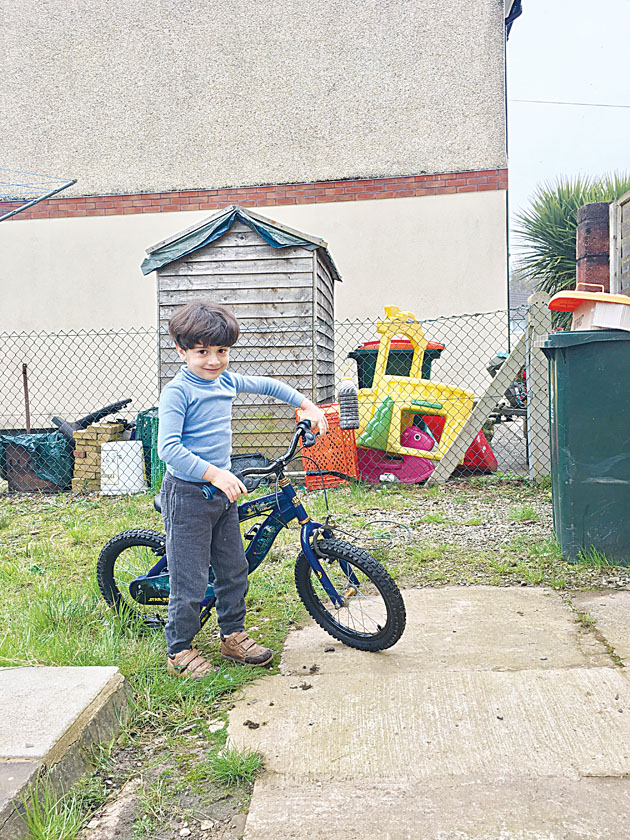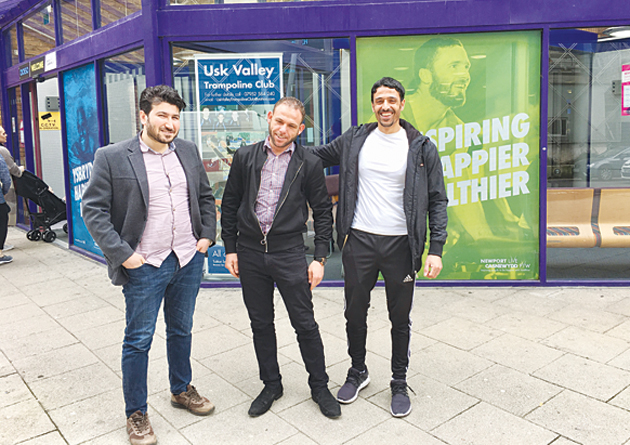NEWPORT, UK: France was almost the final stop on Mohammad Abdulhameed’s long journey from Syria. Standing at the top of the Eiffel Tower, he watched people gazing excitedly at the view of Paris below.
“I saw those people and thought, this is my life now, but it could be yours,” he recalled.
“Seven years ago I had planned to come to France and England to see those places as a tourist, too.”
Instead, he found himself seeing Europe for the first time as an asylum-seeker on a treacherous four-month journey that took him through Greece, Serbia, Slovenia, Croatia, Austria and Germany, before arriving in the French capital and making his way to the “Jungle” migrant camp at Calais. From there he was determined to reach the UK.
“I saw many journalists on the way and they said you’ll die before you reach the UK, it’s impossible,” he told Arab News from a sparsely furnished one-bedroom apartment that overlooks a busy roundabout in the Welsh city of Newport.
More than 10,500 Syrian refugees now live across the UK under the country’s Vulnerable Persons Resettlement Scheme. Almost 400 have been relocated in Wales, including 10 in Newport.
Abdulhameed was luckier than some. Others who, like him, jumped off a bridge on to a moving lorry bound for the UK port of Dover were hurt or killed. “It isn’t worth putting your life in jeopardy for,” he said.
More than 5.6 million people have fled Syria since civil war broke out in 2011 after the government launched a brutal crackdown on protesters during the Arab Spring. As the country descended into chaos, asylum-seekers poured into neighboring countries or traveled further to seek refuge in Europe.
In 2016, 38 European countries received 1.216 million new asylum applications, most of which — 332,665 — were Syrians, according to the UN refugee agency UNHCR. The crisis peaked the previous year, when more than 1 million people tried to reach Europe by sea, prompting EU leaders to introduce quotas as countries began closing their borders. Germany, which welcomed thousands of migrants a week under its open-door policy, implemented stricter controls. In Britain, rising anti-migrant sentiment fuelled a divisive Brexit debate, resulting in the country’s decision to leave the EU and increasing the challenges for refugees arriving in the country.

Refugee boy Yamen was resettled in Newport with his family. (Francis Hawkins© SWNS.com)
Abdulhameed said initially he had hoped to remain in the Middle East.
“Europe wasn’t an option because I didn’t think I’d be able to tolerate being so far from my family,” he said. After arriving in Turkey, he spent 18 months trying to move to the Gulf. “I tried all the countries there and not one of them accepted,” he said. “After the revolution they closed the door on Syrians.”
The forced separation of families has been one of the cruellest consequences of the war in Syria. Adapting to life in the UK provided an initial distraction for another refugee who has settled in Newport, Faisal Almohammad Al-Khalaf. The 31-year-old last saw his wife two years ago when he left Aleppo. At weekends he heads to the gym with friends, but without a reliable source of income, he struggles to make ends meet.
“At first it was exciting, but then the challenges start because you don’t speak the language, can’t find a job and have to find a way to support yourself,” he said.
Employment is a key concern for Syrian refugees in the UK. Asylum-seekers waiting to be granted refugee status aren’t allowed to work, and even with the right papers getting a job can be a major obstacle to building a new life. Those going through the asylum system receive housing support and a £5.39-a-day living allowance.
Mariam Kemple Hardy, head of campaigns at Refugee Action, a British charity, told Arab News: “If you arrive here, for example in winter, you might not have a warm coat, so people are unable to buy some of the most basic things that we take for granted.”
As soon as the letter comes through confirming an asylum-seeker’s application is successful, those granted refugee status have just 28 days to apply for standard UK benefits before the temporary support expires.
“It can take a long time. Often 28 days is simply not long enough, so some people do end up in poverty and destitution,” said Kemple Hardy.
Abu Mohammed brought his family to the UK legally after applying for asylum-seeker status through UNHCR. The family left their home in Homs, western Syria, soon after the outbreak of war and spent four years in Tripoli, northern Lebanon.
“My children can have a better life in the UK. It’s safer here and the education is good,” he said.
When Arab News met the family recently, they had just spent the afternoon at a local church hall, where children had enjoyed playing with arts-and-crafts materials during a party hosted by a community group supporting Syrian refugees in Newport.
“I used to live a proper life in Lebanon, I had my own car, my own shop, my own business … here we have a settled life, but I’m bored,” said Mohammed.
While Mohammed finds the language difficult to grasp, the rest of the family is busy embracing new commitments and making friends. His 16-year-old daughter Manal, an aspiring architect, is excited by the opportunities the move has brought.
“British culture is very different, but you have the opportunity to do as you like. I have more freedom here,” she told Arab News.
The street that Omar, another Syrian refugee, moved to with his wife and three young children resembles every other road on the faceless housing estate in north Newport, where bland beige houses sit in uniform rows, separated by small gardens.
Far from the shops and with no car, it is difficult to get groceries, but Omar, whose name has been changed to protect relatives still in Syria, said that he was “forced to take this house.”
His wife, Reema, is afraid to let the children play on the street as they used to at home in the Damascus suburbs. “They don’t speak the language yet and I’m worried they’ll get lost,” she said.
Omar’s main worry is that they will grow up with no knowledge of Syrian culture. “I see kids here smoking and fighting, and I don’t want them to do that — the culture here is different,” he said, adding that they plan to return home as soon as the situation settles.
His eldest son, Mohammed, 12, sees things differently. “I don’t have friends at home, but I do at school and I play a lot of football.” Back in Syria he played football with a watermelon, his mother said.

Abdulhameed with fellow asylum-seekers Faisal Almohammad Al-Khalafand Jasim Al-Hasan in Newport. (AN photo by Olivia Cuthbert)
Despite their concerns, she feels safe and welcome in the UK. “People always smile at us and the neighbor comes over to chat sometimes,” she told Arab News.
Even after traveling across Europe and standing at the top of the Eiffel Tower, Abdulhameed cannot put the turmoil of Syria behind him. Having lived for several months under Daesh rule in Deir Ezzor, in eastern Syria, and seeing many friends suffer at the hands of the regime’s forces, he still gets a jolt of anxiety every time a police officer passes before remembering that here he “can trust the British police.”
This sense of security is all the more important to him since becoming father to six-month-old Maria. He is raising his daughter single-handedly until his wife, Khadija, can join him on a study visa.
As a Bahraini woman married to a foreigner, she is not allowed to pass on her nationality, while Abdulhameed’s refugee status means that he is unable to deal with the Syrian embassy. “Your existence is your nationality, but as a refugee I couldn’t give my daughter anything,” he told Arab News.
In five years, Abdulhameed will be eligible for a British passport and the family can become citizens of their adopted country. Until then, even though he is “treated like a British person,” the insecurity that has defined their lives for the past seven years will linger.
Bringing Maria’s mother to live with them will go some way toward alleviating the “extremely painful” separation that the family is forced to endure.
Khadija had just one month with Maria after giving birth before her UK visit visa expired. In her absence, Abdulhameed has gone part-time at the local council, where he teaches English to other Syrians, to focus on “being a good father,” although the cut in his salary has meant he had to apply for more financial support.
Above the bed in the small but well-kept flat, he has stuck letters on the wall that say “K heart M” — Khadija loves Maria. It’s the closest she can get, he said.
“I can’t do anything, all I can do is look after Maria.”




























